

Exxon's Oil Industry Peers Knew About Climate Dangers in the 1970s, Too. The American Petroleum Institute together with the nation's largest oil companies ran a task force to monitor and share climate research between 1979 and 1983, indicating that the oil industry, not just Exxon alone, was aware of its possible impact on the world's climate far earlier than previously known.
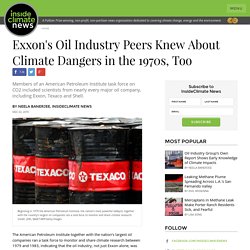
The group's members included senior scientists and engineers from nearly every major U.S. and multinational oil and gas company, including Exxon, Mobil, Amoco, Phillips, Texaco, Shell, Sunoco, Sohio as well as Standard Oil of California and Gulf Oil, the predecessors to Chevron, according to internal documents obtained by InsideClimate News and interviews with the task force's former director. An InsideClimate News investigative series has shown that Exxon launched its own cutting-edge CO2 sampling program in 1978 in order to understand a phenomenon it suspected could harm its business. "It was a fact-finding task force," Nelson said in an interview. Exxon's climate lie: 'No corporation has ever done anything this big or bad' I’m well aware that with Paris looming it’s time to be hopeful, and I’m willing to try.
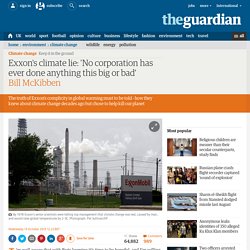
Even amid the record heat and flooding of the present, there are good signs for the future in the rising climate movement and the falling cost of solar. But before we get to past and present there’s some past to be reckoned with, and before we get to hope there’s some deep, blood-red anger. Exxon Advertised Against Climate Change for Decades After Top Executives Knew Burning Fossil Fuels Would Warm the Planet. This week, Inside Climate published some new revelations about one of the world’s biggest oil companies: that scientists working for Exxon knew about climate change as early as 1977.
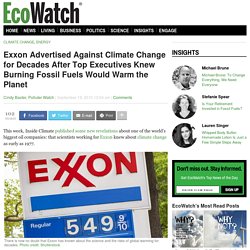
Exxon’s own scientists conducted an extensive research program on climate change and “The Greenhouse Effect,” running complex CO2 monitoring experiments and publishing peer-reviewed papers, because the company was deeply interested in this emerging threat to its core business, oil and ultimately the company’s survival. There is now no doubt that Exxon has known about the science and the risks of global warming for decades. The news will perhaps be of great interest to those lawyers who successfully prosecuted the tobacco industry, which hid its knowledge of the science around tobacco’s addiction, and the impact of second hand smoke.
Exxon Exposed for Spending Millions on Climate Change Denial. ExxonMobil spokesman Richard Keil told a carefully worded whopper last week.

After the Union of Concerned Scientists (UCS) revealed that Exxon was aware of the threat posed by climate change as early as 1981 and has intentionally been deceiving the public for decades, reporters contacted Keil for comment. One reporter asked him about ExxonMobil’s long history of funding climate change denier groups. Email Shows Exxon Was Studying Its Climate Impact in the '80s. Exxon scientists studied the impact of greenhouse gas emissions on global warming as far back as 1981, an indication that the company was probing the industry's potential contribution to climate change much earlier than previously reported.
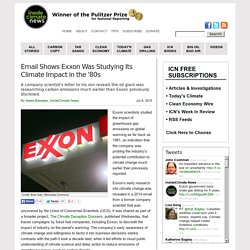
Exxon's early research into climate change was revealed in a 2014 email from a former company scientist that was uncovered by the Union of Concerned Scientists (UCS). It was shared as part of a broader project, The Climate Deception Dossiers, published Wednesday, that traces campaigns by fossil fuel companies, including Exxon, to discredit the impact of industry on the planet's warming. The company's early awareness of climate change and willingness to factor it into business decisions starkly contrasts with the path it took a decade later, when it led efforts to cloud public understanding of climate science and delay action to reduce emissions of greenhouse gases, such as carbon dioxide. In an email, Bernstein declined to comment. Naomi Klein Interview: “A 3-Day Week Will Help to Save Life on Earth” Imagine an ordinary, full-time working week, one that requires just 21 hours of hard graft.
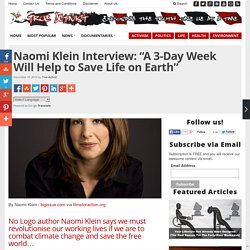
Imagine a less frantic existence – three days on, four days off. Imagine more time with the family, more time strolling round the park, more time listening to your favourite music while cooking at a leisurely pace. A lovely idea – but does it really stack up?